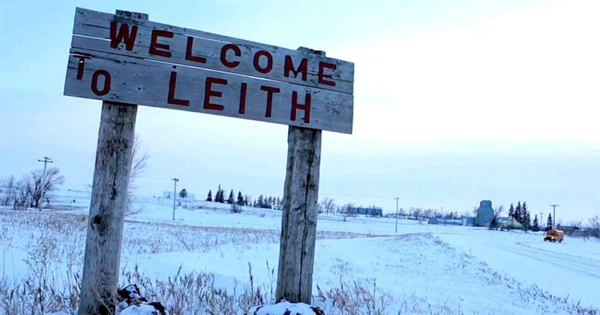Movie review by Greg Carlson
Craig Cobb, the white supremacist who purchased properties in Leith, North Dakota as part of a warped plan to establish a community for like-minded racial separatists, takes center stage in “Welcome to Leith,” recipient of the Bill Snyder Award for Documentary Filmmaking at the 2016 Fargo Film Festival. Principally examining the period during which Cobb’s actions and publicity-seeking behavior ran afoul of the townspeople (depending how you count, not more than two dozen souls) and ended with Cobb’s arrest and subsequent incarceration, the riveting feature by directors Michael Beach Nichols and Christopher K. Walker premiered at the 2015 Sundance Film Festival.
Echoing Jesse Moss’ “The Overnighters” as another documentary focused on themes of outsiders/insiders in one of the nation’s least populous states, “Welcome to Leith” succeeds in part because of the all-access privilege enjoyed by the filmmakers, who shadowed both Cobb and Leith mayor Ryan Schock over a period of time. The moviemakers also get to know key players like the no-nonsense Lee Cook, Leith’s only African-American resident Bobby Harper, and Cobb’s confederate Kynan Dutton. Both “The Overnighters” and “Welcome to Leith” observe details of North Dakota life that alternately refute and reinforce stereotypes about the inhabitants – both newly arrived and lifelong.
Many North Dakotans followed the unfolding events in Leith without knowing that Nichols and Walker were simultaneously collecting the images that would be shaped into their film. As a result, locals may view the finished work with a sense of déjà vu. Key flashpoints in the Cobb saga, including the town’s efforts to pass ordinances that would require sewer and water for property owners, the November 2013 arrest of Cobb and Dutton on terrorizing charges after they patrolled Leith on foot with loaded rifles, and Cobb’s appearances on broadcast media, are communicated with clarity and urgency.
In one moment that will remind some of the circus-like atmosphere that set up a broken nose for Geraldo Rivera in 1988 when a brawl erupted after a confrontation between John Metzger and Roy Innis during a taping, Cobb appears as a guest on “The Trisha Goddard Show,” a syndicated talk tabloid. Goddard shares the results of Cobb’s DNA test, shocking the grinning hatemonger and the hooting studio audience with news that fourteen percent of Cobb’s genetic material comes from Sub-Saharan Africa. The no-publicity-is-bad-publicity revelation seems to be of little consequence to Cobb, who accrues his power from page views and time spent in the public eye.
Whether or not the filmmakers go too easy on Cobb is debatable, but the objective and observational style of the photography and editing suits the atmosphere of dread and unease that mounts with each of Cobb’s disconcerting and alarming antics. Following the incidents covered in the film, Cobb got up to his old real estate acquisition tricks in Antler, North Dakota, bidding – but eventually losing to the city – on a trio of properties. Not surprisingly, Cobb, according to Forum Communications reporter Adrian Glass-Moore, claimed that he intended to change the name of Antler to “Trump Creativity” or “Creativity Trump.” Glass wrote that the proposed alteration would be “in honor of Donald Trump, who Cobb admires deeply.” Welcome to Leith and welcome to America.
“Welcome to Leith” will screen on March 18 at 7 p.m. at the Fargo Theatre as part of the 2016 Fargo Film Festival. Directors Michael Beach Nichols and Christopher K. Walker will be there to take audience questions.
